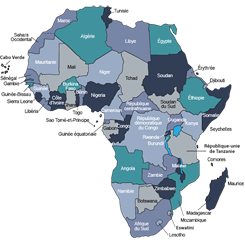Africa: The challenge of quality distance education for all

When the World Health Organization declared the 2019 novel coronavirus (COVID-19) a global pandemic, it signalled the beginning of a new era for education. The circumstances of an unprecedented public health emergency, also marked by an education crisis, paradoxically appear to be a window of opportunity – one with the potential to transform education on a global scale for years to come.
Since March 2020, 185 countries and territories have decreed the closure of schools for more than a billion students, and the need for States to change learning models has become all the more pressing. The global shift means Africa must reposition its education ecosystems as part of this movement for change, in order to meet the major challenge of ensuring continuity in quality education for all.
Several governments have turned away from traditional methods of learning so as to preserve educational continuity while limiting the spread of the virus. National strategies for responding to the pandemic have turned towards alternative forms of education, where teachers and students are no longer physically present.
All schoolwork is now done at home. How can distance education and the quality of learning be ensured for all students, including the most vulnerable? There are numerous possibilities – such as radio, television, printed materials, digital platforms, tablets, and smartphones – but not all offer the same learning opportunities. And, considering the wide range of local realities, to what extent can such channels help students pursue education through distance learning?
To make these choices clearer for public authorities, IIEP-UNESCO Dakar has published a memorandum on The challenge of monitoring quality in basic distance education.[1] This publication was produced under the regional programme to support quality management in basic education. It examines various channels in order to determine their relevance, based on educational issues.
The educational offering must adapt to the wide range of local contexts
E-learning via digital platforms, using a computer or smartphone, has been widely covered by the media. There are indeed a number of advantages to this means of education. It provides free and widespread access to educational resources. Content can be viewed live or rebroadcast, giving students the opportunity to work independently. Digital systems are widely popular with students and help maintain educational relationships, even at a distance. However, these tools cannot be effectively used without pre-service training, and require a good quality internet connection.
‘Even as ministries of education engage in the development of contingency plans to ensure educational continuity in teaching, 89% of learners in sub-Saharan Africa do not have access to computers at home and, among those who do have access, 82% do not have an internet subscription. The educational offering must therefore take into account the level of internet coverage by geographical area and access to electricity,’ emphasizes Patrick Nkengne, a senior expert in quality management at IIEP-UNESCO Dakar and co-author of the memorandum.
Beyond digital platforms, other channels have potential advantages for distance education in Africa – notably radio, the most accessible means of communication. According to UNESCO data, more than 80% of households on the African continent have access to a working radio set. Educational resources for radio are already available in a number of countries, and information can be broadcast in local languages. One limiting factor, however, is that students, who are often busy with housework, may not tune in to the programme’s scheduled broadcast. The same issue applies to television, which has considerable reach in Africa. Most countries have national channels to broadcast educational programmes, but content cannot take into account the grade level of each student. Moreover, television does not allow for teachers and students to interact; students are just spectators and cannot go at their own pace or ask questions.
In the memorandum, IIEP-UNESCO Dakar experts highlight factors for those involved in education to consider in order to ensure the quality of distance education: the relevance of proposed content, coverage of the target audience, and monitored learning. Modes of distance education need to respond to a wide range of local contexts, and must be examined in this light from an early stage.
[1] A second memorandum will report on the mechanisms used by ministries of education in sub-Saharan African countries.
Dowload the memorandum: The challenge of monitoring quality in basic distance education, Regional programme to support quality management in basic education, IIEP-UNESCO Dakar, 2020.
Find out more about the IIEP-UNESCO Dakar Regional Quality Management Support Programme


